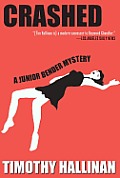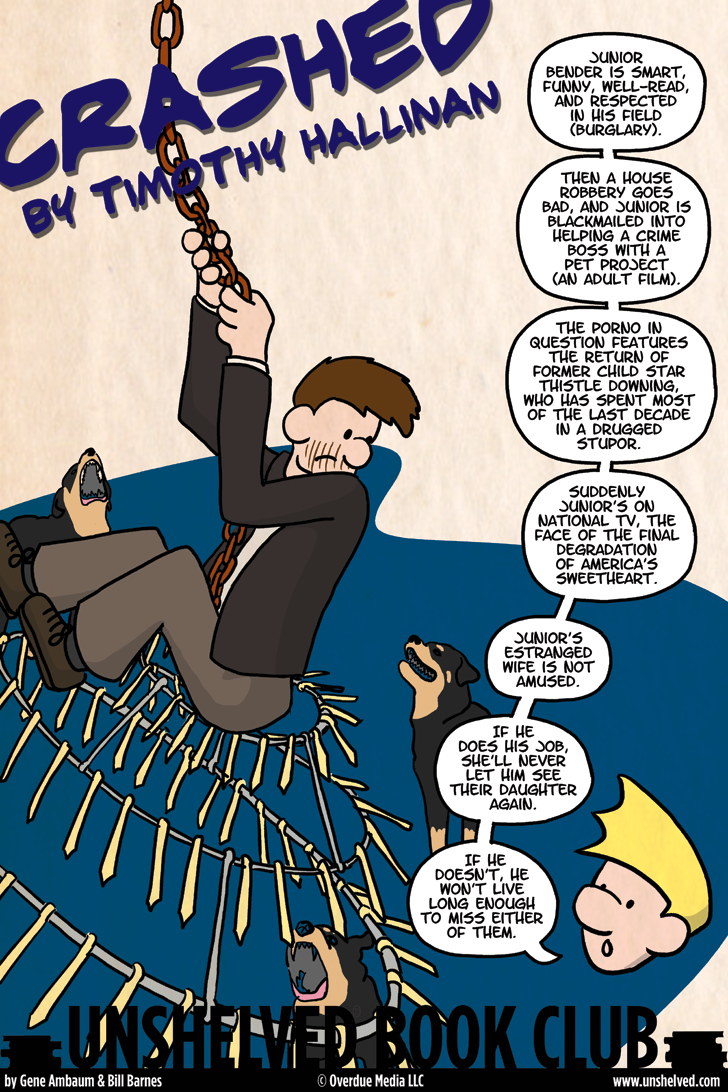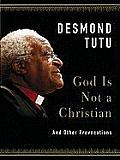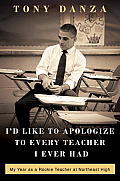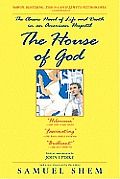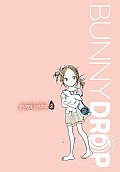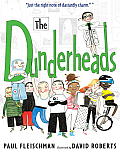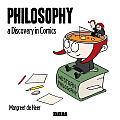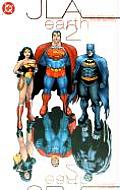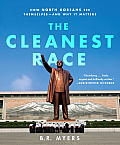Link to this review in the form of a comic strip by billba tagged mystery
Link to this review by davidtomashek tagged nonfiction
The title is a quote from one of Archbishop Desmond Tutu’s speeches on religious tolerance. Although Tutu is known as a major figure in the struggle against the apartheid regime in South Africa, he is also involved in global issues of justice, tolerance, and diversity.
Tutu points out the illogic and unfairness of assuming that a majority of people will be consigned to hell due to accidents of history and geography. He believes respect for all people includes respecting their relationship with the divine. Although the title and first section of the book address religious pluralism, the book spans a wide range of issues that are important to Reverend Tutu, including human rights and the African concept of ubuntu (a person is a person through other persons).
Why I picked it up: Desmond Tutu was my hero back in the 1980‘s. I have to confess that after apartheid ended in South Africa, I lost track of him because he no longer appeared in the news. This seemed like a good way to catch up, plus I loved the title.
Why I finished it: Tutu speaks with a clear sense of right and wrong, even when the right thing is not popular with his allies. For example, in working for justice in post-apartheid South Africa, he asked blacks to forgive the former regime when wrongdoing was acknowledged by the perpetrators. I was also pleased that he didn’t soften his convictions in different contexts. Forgiveness of the oppressors was considered key to moving forward in post-apartheid South Africa, but it was controversial when Tutu suggested it in the guestbook of the Jerusalem Holocaust Museum.
I’d give it to: In college I was in an anti-apartheid rally when a young woman came up and started lecturing the protestors on the wrongness of our cause. Her father had extensive business dealings in South Africa, and she said if we saw the situation there we would realize that the blacks would never be able to govern themselves. I like to think of this woman reading this book twenty-five years later. I wonder what her attitude is now.
Link to this review by sharonlevin tagged nonfiction
Tony Danza of Taxi and Who’s the Boss? fame went back to school so that he could teach high school. He taught in Northeast High School in Philadelphia, a school with 3600 students. His year at the school was supposed to be made into a reality TV program. It was filmed for part of the year, but the producers decided there wasn’t enough drama. They tried to create conflict between students for the sake of ratings, but Danza protected his students and refused to help. The show was cancelled and he taught and coached football for the rest of the year without the cameras.
Why I picked it up: I was going on vacation and needed a few paperbacks to bring with me. I had an ARC of this and figured it would be a fun, funny read.
Why I finished it: It was. It was also predictably heartwarming and frustrating to see the hurdles students and teachers have to deal with, including way too much time spent getting ready for standardized tests.
And I really ended up admiring Danza’s principles and wishing all high school classes were taught like his. The way he approached teaching The Odyssey was truly inspiring. He set it up as a scavenger hunt and the students had to read clues, go to the places like Circe’s Island as Odysseus did, and then answer questions about that part of the text before being given a clue to their next destination. Brilliant!!
I’d give it to: I’d start with Arne Duncan, who never met a standardized test he didn’t like. It’s time for him to learn the difference between bubble tests and real education.
Link to this review by flemtastic tagged humor • literary
Roy Basch and a fellow medical student interning at a Jewish teaching hospital named The House of God are nervous about their rotation in the emergency room. Old people, a.k.a. gomers (an acronym for “Get Out of My Emergency Room”), make up a majority of their patients. The way their advisor, the Fat Man, teaches them to care for gomers does not appear in any textbook. For example, they are taught to make room in the ER by transferring patients to different departments by altering charts in order to emphasize key terminology and exaggerate descriptions of medical issues. The interns learn how to survive sleep-deprivation and overcome mistakes that can kill their patients. In the midst of all this the interns also find on-site opportunities for recreational sex to help ease their tensions.
At the end of his year Roy must choose a medical specialty. This alternately thrills and depresses him, causing relational issues with his girlfriend. Eventually Roy and his fellow surviving interns must decide how to proceed in the medical field, and what kind of doctors their ER experiences will make them.
Why I picked it up: Recommended to me at a dinner party where I had the good fortune to be seated next to Blake Charlton, a hilariously blunt young man who graduated from Yale, has published two bestselling fantasy books and is currently a med student at Stanford. I was asking him about being a medical intern and he recommended this book.
Why I finished it: It’s Catch-22 for the medical field. The interns’ morbid senses of humor help them deal with the stress of making life and death decisions. I also kept envisioning the Fat Man’s invention, Dr. Jung’s Anal Mirror. It would allow anyone to see his or her own anus, an area that the Fat Man describes as being like the Congo — a great mystery to most. It involves a complicated setup involving multiple mirrors. He has thus far been unable to create a prototype, though I share the Fat Man’s optimism that it could work!
I’d give it to: My father, a retired general practitioner. He used to tell me wild tales of working with cadavers, like the one about his friend who was kicked out of medical school for using a probe to make it look like a cadaver had an erection. I want to hear the unvarnished account of his experience as an intern, because the interns in this book are merely trying to stay afloat — they don’t have time to spend on learning.
Link to this review by geneambaum tagged graphic novel
After his grandfather died, Daikichi stepped up and volunteered to care for his grandfather’s six-year-old daughter, Rin.
Rin says she doesn’t remember her mother, and it doesn’t look like she ever lived at his grandfather’s house. Daikichi sets about uncovering her past and finding her mother.
Why I picked it up: I liked the first volume, and I’m getting antsy waiting for the next volume of Yotsuba, which is also about fatherhood and an odd young girl.
Why I finished it: It’s fun to watch Daikichi figure out what he needs to be worrying about as Rin’s guardian. As he talks to mothers at her school, he starts to panic about her not taking after-school lessons, and the fact that he’s already missed the application deadline for most elementary schools. And he has to figure out how to fix Rin’s hair.
I’d give it to: Allen, both because Rin looks like his daughter, and because he’d identify with Daikichi’s difficulties balancing his duties as a father with work and his social life.
Link to this review by geneambaum tagged picture book • humor
Miss Breakbone hates her students. She calls them dunderheads and loves to confiscate their possessions. But when she takes a one-eared cat figurine that Junkyard was going to give to his mom for her birthday, Einstein puts together a plan to get it back.
Why I picked it up: The kids on the cover sucked me in. They look like they’re ready for anything.
Why I finished it: Miss Breakbone reminded me of the best of Roald Dahl’s villains — she has an electric chair in her classroom. The kids also each have a nickname and a particular talent. My favorite was Hollywood, who spends so much time watching movies that they affect how she sees the world (which can be useful).
I’d give it to: Eleanor, who would laugh at the way Google-Eyes uses her hypnotic skills to put the whammy on both dogs and people.
Link to this review by snow tagged nonfiction • graphic novel
In a brightly colored graphic novel, Dutch comic artist Margreet de Heer meanders through philosophy, touching on influential philosophers and meditating upon the great philosophical concepts: “What is Thinking?” “Who Do We Think We Are?” “How Do We Know Ourselves?” “What is Free Will?” “What is Reality?” To expand her topics, Margreet pulls examples from her own life and from the lives of her friends and family, creating a work that is as personal as it is instructive.
Why I picked it up: I never studied philosophy in college and this comic guide looked like it would break things down into easily digestible chunks.
Why I finished it: Margreet, with help from her husband/colorist Yiri, does exactly what I’d hoped she’d do. I got an overview of philosophy with difficult concepts explained in a variety of ways. I got an introduction to the basics that left me with a desire to learn more. I love a book where, just when I think, “I need an example to understand that,” I turn the page and Yiri is telling Margreet, “It’s getting a bit abstract now…Can you give a concrete example here?” And she does.
I’d give it to: Xina, a science fiction and fantasy buff who likes to grapple with grand thoughts. She would love that Margreet quotes Harry Potter (“It is our choices, Harry, that show what we truly are, far more than our abilities.”) and that Yiri references The Matrix in their discussions of Aristotle and Socrates.
Link to this review by billba tagged graphic novel • superhero
The heroic Justice League visits another Earth victimized by evil versions of themselves, the Crime Syndicate of Amerika.
Why I picked it up: I was always a huge nerd for DC Comics’ Earth 1 / Earth 2 crossovers, where “modern” superheroes (Flash has a sleek red suit, Green Lantern’s ring came from aliens) teamed up with their “golden age” counterparts from a different universe (Flash has that dorky Mercury helmet, Green Lantern’s ring is magic). Then they decided this was too confusing, and crammed all their universes together. It was a huge mistake. Ten years ago I saw this title on the shelf and was excited that maybe they had changed their minds.
Why I finished it: No such luck. This Earth 2 was a one-off brainfart by mad genius writer Grant Morrison. But it’s still incredibly enjoyable to go with him on a lunatic joyride through this alternate universe, as illustrated by the great Frank Quitely. Benedict Arnold helped the United States of Amerika brutally colonize England, the friendly skies are flown by KKK Southern Airlines, Lois Lane is a kinky Superwoman, Johnny Quick gets his speed powers through drugs, and Owlman fights Thomas Wayne, who became Gotham’s police commissioner to avenge the childhood death of his son, Bruce.
I’d give it to: Mark, who taught me to love dystopias. As a playwright he’ll dig the second act: just as the Justice League is trying to figure out why they keep failing to help the people of this new world, things go from bad to worse. The eventual reveal of the real villain is just beautiful.
Link to this review by flemtastic tagged nonfiction
Myers argues that an understanding of the Democratic Peoples Republic of Korea (DPRK, or North Korea) is incomplete unless one has a thorough understanding that North Koreans view themselves as a racially pure people. They value naivete because it shows a certain childishness and lack of devious planning that other countries supposedly use. This has implications for our foreign policy toward them and helps explain the context in which they see their treatment at the hands of other nations. (For example, they believe their naivete made them more susceptible to savage treatment by the Japanese occupation of Korea.) To this day, North Koreans in mixed marriages are often beaten or forced to divorce because their relationships dilute racial purity.
While many Westerners expect North Koreans to have a complete disregard for their government’s seemingly laughable propaganda, that is simply not the case. DPRK citizens take the information seriously and often accept it as fact. North Koreans seem to have a genuine admiration for the Dear Leader, including those who have managed to escape. The great famine that killed up to fifteen percent of the country’s population in the 1990’s was explained away by news articles. A citizen even stated, “We have not properly taken on the work you gave us to do, General.” The implication was that the workers had failed, not the Dear Leader. The media also promotes racial superiority — during the Korean War, stories were published that talked of the disgust of North Korean jailers at the stench of captured American soldiers.
Why I picked it up: I have been fascinated by North Korea for years, and I read anything that promises a peek inside. The premise that a country of millions could be held in ignorance of the world in this day and age is crazy, and I wanted to learn how North Koreans’ self-image contributes.
Why I finished it: Why I Finished It: I learned of a group of young Japanese people called hikikomori. They seek complete isolation, even demanding that their parents leave meals on trays outside their rooms. The author draws parallels between them and North Korea because the DPRK also seeks complete isolation. Myers supports this by showing that its economic policies focus on maintaining isolation, leading it to refuse all foreign aid that would impact its isolation.
Because North Korean media promotes the idea of racial superiority through news stories, poems, and even novels, depicting physical infirmities is a no-no. Kim Jong Il had a goiter on the side of his neck, but it was carefully kept out of news coverage by always filming his good side.
During the 1990’s famine, the government stranglehold on information faltered, and North Korean awareness of conditions in South Korea grew. This left the DPRK unable to use one of their favorite stories, that U.S. soldiers use South Korean kids for target practice, lest their propaganda be so recognizably untrue that they would lose face.
I’d give it to: Rich, who would appreciate how this book calls for careful foreign policy considerations instead of soundbite-friendly rhetoric. Fanning the flames of internal unrest in the DPRK is not desirable to the U.S. — it would require the North Korean decision-makers to up their level of provocation to justify their grip on power. And current DPRK leader Kim Jong Un cannot hope to disarm and maintain his position. Peace is as dangerous to his regime as war.
